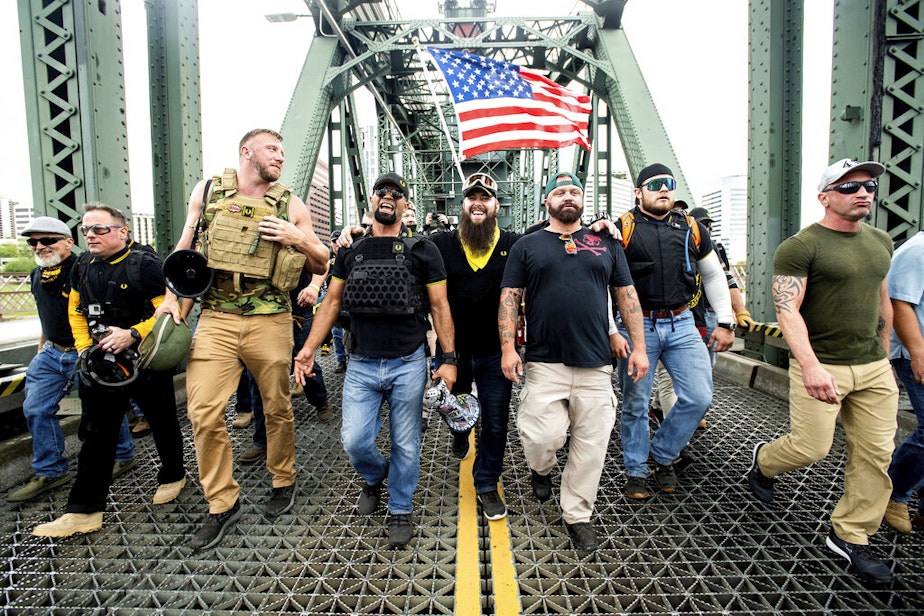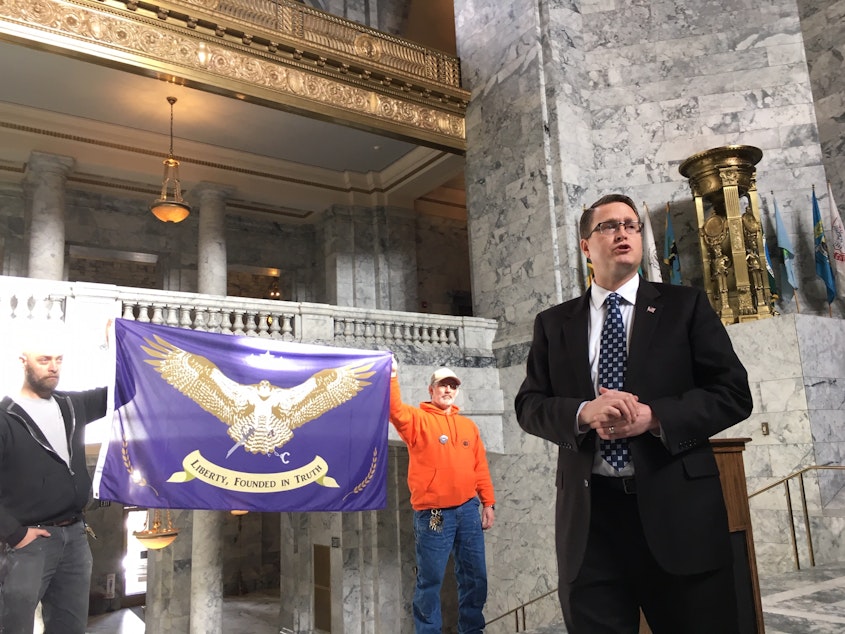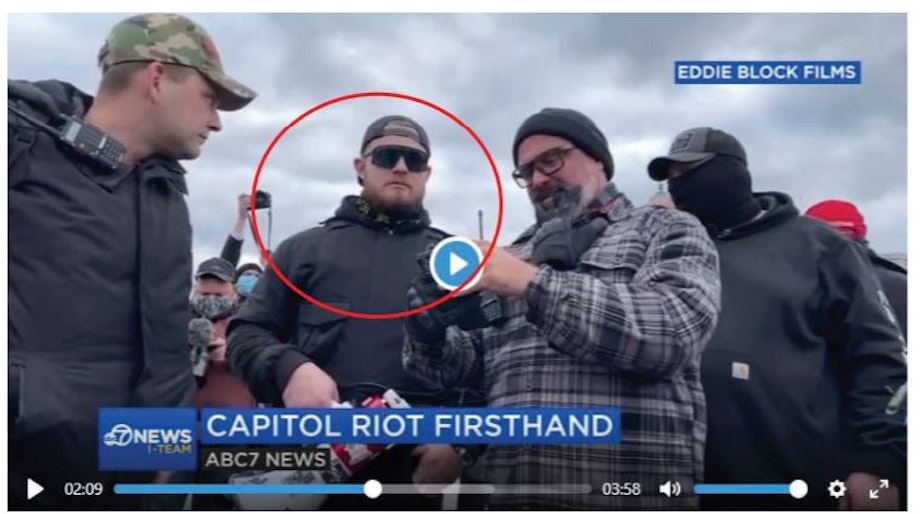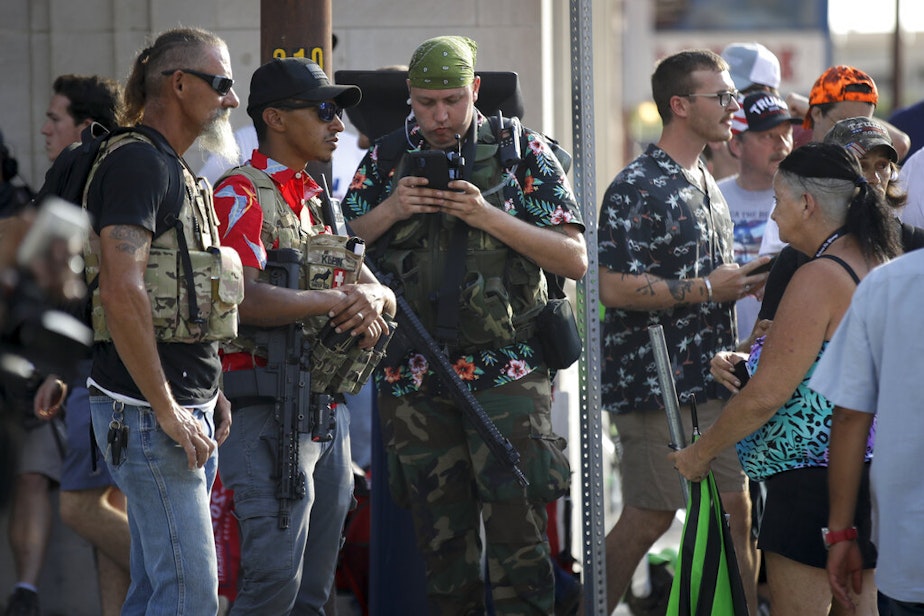Extremist groups 'popping up left and right' in NW, law enforcement officials say

In December 2009, after a political rally, Spokane Sheriff Ozzie Knezovich was chatting with fellow Republicans, when a woman walked up and joined the conversation. She kept asking the sheriff if he was ready for Christmas.
“Well yeah, I think we got that taken care of,” the sheriff responded. But the woman continued to press the point — was he ready for Christmas?
“And I said, 'Ma'am, why don’t you fill me in. What are you actually talking about?’”
For help understanding the complicated web of extremism, check out this summary; a companion to this article.
What she was "actually talking about" is part of a much larger threat that Sheriff Knezovich has long sounded the alarm on: extremism.
While many in the nation were shocked on January 6, as extremists violently broke into the Capitol Building in Washington D.C., people like Sheriff Knezovich were not. It was an echo of what he has seen over his law enforcement career throughout the Pacific Northwest.
The sheriff has watched the issue grow since white supremacists attempted to recruit him in a barber shop in the early 1990s. He saw it in 2011, when a man planted a bomb along Spokane's Martin Luther King Day parade route. Knezovich says he has received death threats for shining a light on such extremism (he has also received threats for his opposition to gun control).
Knezovich isn't alone in seeing this trend. Abass Golfrey, assistant special agent in charge for the FBI's office in Seattle, said these groups are frequently emerging.
Sponsored
“Regarding antigovernment, anti-authority extremism related matters," he said, "we have them on the left and on the right."
That day in 2009, when the woman asked about Christmas, was illuminating to Sheriff Knezovich.
The sheriff learned that an organized group in the Spokane area aimed to establish their own government, separate from Washington and the United States. The group had its own constitutional convention, elected a president, and even had a supreme court. At the time, they intended to carry out their plans on Christmas. This didn't materialize, but the sheriff uses this example to show that extremist groups are waiting for moments of crisis so they can step in and fill the role of government.
Sheriff Knezovich is a vocal Republican who supports gun rights, says police militarization is a myth, and has at times supported President Trump. But he says he draws a line between his conservative beliefs and extremist elements he believes are infiltrating his party. Elements like he encountered that night.
“None of this is about saving the United States,” Knezovich said. “It’s about pulling this country apart. Both sides (extreme left and right) talk civil war and revolution … these people want power. This is about having their way. There is no dissent with them. If you dissent, you are the enemy."
Sponsored
He said people from the Northwest were in Washington D.C. on January 6.
"It’s really sad that good people get sucked into that vortex, but you have to be careful about who you are listening to. These are rabid dogs and they couch everything in ‘protect the Constitution,’ when they want to destroy it.”
Extremist roots run deep in the Northwest, weaving through the foundations of unrelated groups and ideologies, going back decades. Whatever the motivation, common themes are antigovernment. They often embrace conspiracy theories or their own interpretation of history or religion. Commonalities include the desire for chaos, violence, and destruction.
The Southern Poverty Law Center's "hate map" shows 22 such groups in Washington state. But modern extremism defies boundaries, physically and ideologically. Groups make inroads to various aspects of society, from military service to political office. They may share antigovernment beliefs, but do not share the same motivation (religion, white supremacy, etc.).
Neo-Nazis have been around in Washington state since the 1970s at least.
Sponsored
That's when The Turner Diaries, a white supremacist novel was published, which inspired a neo-Nazi group called The Order based in Washington state.
The Order robbed banks and was responsible for the assassination of a Jewish radio host, among other crimes. The leader of The Order was killed in a shootout with federal agents on Whidbey Island; the day of his death is now an annual holiday for white supremacists.
Fast forward to 2021, and elements of that book were cited at the January 6 riot at the capitol. The insurrection included Trump supporters, conspiracy theorists (who say they are fighting Satan worshiping pedophiles in the deep state), and boogaloo boys (who want a second civil war). Some fashioned nooses and referenced a "Day of the Rope," which is taken from The Turner Diaries, describing the hanging of traitors, including politicians and journalists.
This companion article may help with understanding that complex web of information.
Holding extreme beliefs is not illegal. In fact, the FBI does not investigate extremist groups. Rather, law enforcement becomes involved when crimes are committed, and incidents rise to the level of domestic terrorism.
Sponsored
A homeland
Sheriff Knezovich said what he encountered on that night in 2009 "was basically sovereign citizen ideology.”
Sovereign citizen ideology sometimes mingles with other antigovernment movements, such as Christian Identity — a white supremacist interpretation of the Bible. The Northwest has long been targeted by white supremacists with the potential of converting it into a white ethno-state.
RELATED: Mayor’s Q-related comments cause continuing controversy in Sequim
“Their ultimate goal is to form their own state," Knezovich said. "They want to destroy this country. They want their own nation. It goes back to the old Christian Identity movement of a white homeland, comprising of Idaho, Montana, Wyoming, Oregon, Washington — and about 15 to 20 years ago they added Alaska to that.”
Sponsored
After the woman left the conversation, the sheriff turned to another Republican and said that if either of them adopted that philosophy, it would not end well for them.
That other Republican was Matt Shea, a state senator who would later promote the secession of eastern Washington — an effort that whistleblowers say was aimed at creating a theocracy which would oppress non-believers and was a "weaponized version of Christianity." That allegation came alongside video of Shea talking with young men (Sheriff Knezovich would argue they are "boys") who were training for Christian war.
Shea was also suspended from participation in the Republican caucus after an investigation found he promoted political violence and engaged in domestic terrorism (Shea calls this investigation a "sham" and a "political hit job").
Shea has also countered allegations against him on his Facebook page, saying that controversial, leaked documents were actually notes on a Bible study, and not a manifesto as reported.
Shea has argued that he has not conspired to commit political violence, rather that he conducts background checks on political opposition as well as people who are threats to his family and community.
These reports have prompted a local, semi-parody website to monitor news on the politician.
Shea is also reportedly a member of the Oath Keepers, a group comprised of current and former military, police, medics, and other first responders. Oath Keepers are among the groups involved in the Jan. 6 storming of the U.S. Capitol Building.
Military and police are often targeted by these groups for recruitment. Sheriff Knezovich notes that he was once approached by neo-Nazis as a police officer in Wyoming.
Recently, U.S. Defense Secretary Lloyd Austin signed a memo prompting discussions to counter extremism within the military service. While Austin said that involvement of military personnel in the Jan. 6 incident was relatively small, it was "not as small as anyone would like."
NPR reports that "roughly a dozen National Guard troops were dismissed from inauguration duties — at least two of whom for alleged links to extremism."
At least five Seattle police officers also attended the Jan. 6 rally in D.C. Whether they participated in the storming of the Capitol is being investigated.
Shea no longer represents Washington House of Representatives District 4. He continues to speak out via his podcast, which states he is broadcasting "from deep inside the heart of future Liberty state."
Sheriff Knezovich says he saw red flags starting in 2009, long before political pressure ousted the state senator.

“After that (2009 event), I saw him get more and more involved with that,” the sheriff said, noting that Republican leadership had asked him to mentor Shea at the time. By 2012, Knezovich told leadership that “I can’t do it. I’m done with this guy. He’s dangerous.”
The sheriff said that he has received death threats, photos of himself with guns pointed at his head, as the result of not aligning with Shea. Others report of intimidation tactics from the politician, which has included conducting surveillance of political opposition.
"The sad part about it is the local media kept trying to play this off as some kind of grudge match, a feud between Matt Shea and Ozzie Kneozovich,” the sheriff said. “It never was. I was warning people about the dangerous ideology I was watching Matt Shea associate with and become part of. And he actually became the leader of that movement.”
Extremism “popping up left and right”
Homeland Security has issued a warning for extremist violence in the wake of the recent insurrection. According to Abass Golfrey, assistant special agent in charge at the FBI’s Seattle office, the FBI does not have any specific threats in the Northwest region.
Extremist groups have recently posed a challenge for national law enforcement, Golfrey says, because “these groups are popping up left and right.” Beyond that, their boundaries can be fluid, with members in multiple movements, subscribing to various ideologies all at once.
“We do have cases, investigations that meet these kinds of extremism, here in (Washington) state and across the country,” Golfrey said.
“Take the Proud Boys,” he said. “Proud Boys (is led) by a Latino individual. But within some Proud Boys elements, in some states, it’s an ethno-type group. So the groupings are becoming amorphous; they shift when it’s convenient for them."
The FBI cares less about the groups themselves than violations of federal law, Golfrey said. The FBI becomes involved when a crime is committed.
RELATED: Canada classifies Proud Boys as terrorist group alongside ISIS and Al-Qaida
In September 2020, FBI Director Christopher Wray testified to the House and Senate that the agency had more than 1,000 cases and 120 arrests so far that year, all involving extremists ranging from violent anarchists to racially-motivated groups.
While incidents involving left-wing extremism is a concern for law enforcement, within the domestic terrorism category, white supremacist violence is the largest issue the FBI is facing. It is responsible for the most lethal activity in the United States.
Golfrey echoes that statement, saying that racially motivated violent extremism, along with antigovernment / anti-authority groups are currently the two most active extremist categories.
In Washington state, such groups have organized flier campaigns, often using words like "patriot" that mask deeper motives.
“They move around,” Golfrey said. “You could have a camp somewhere in Washington state, for example. That camp may attract folks from New Jersey, Atlanta, all over. Some stay for a few weeks or months and leave. These folks move around and are nationally connected. As far as the January 6 Capitol breach investigations, folks came from everywhere.”
While Golfrey was presenting a hypothetical, a real life lesson is the Atomwaffen Division. The neo-Nazi group has strong ties to Washington state and has organized military training camps locally and in New Jersey.
RELATED: Hate groups decline last year, but hate did not
The FBI has more than 400 investigations into the incident on January 6, with more than 100 prosecutions so far. Seattle Proud Boy Ethan Nordean has been arrested for his alleged involvement that day and has been ordered back to D.C. to face charges.

Joe Biggs, the man behind Proud Boy demonstrations in Portland, has also been charged in the wake of the January 6 capitol riot.
In the Spokane area, the sheriff remains on guard. He says that he is managing threats from both left- and right-wing groups. For example, he points to the boogaloo movement — which promotes a second U.S. civil war. The sheriff says that the boogaloo movement has brought left and right extremes together, united by their desire for a fight, further complicating extremist boundaries.

“What unites them? They hate police officers. They hate government. Both of them hate,” Sheriff Knezovich said.
“I’ve really tried to stop talking to the elements that drink the Kool-Aid,” the sheriff said. “I try to talk to the 80% (of the population who aren't extreme) and try to get them to wake up. That’s where this nation will be saved. You have to talk to the heart of the 80% who are starting to wake up.”




